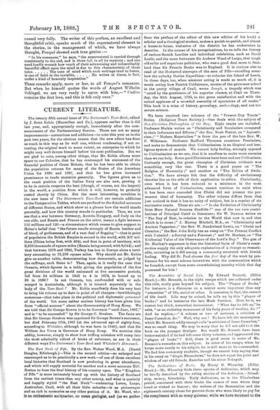this title, really goes beyond his subject. The "Plague of
Books," for instance, is a discourse on a matter more important than any "amenities " of life, social or other. It concerns, in fact, the essence
of life itself. Life may be ruined, be tells us, by this " plague of books ;" and he instances the late Mark Pattison. Here he is, we cannot but think, somewhat inconsistent. " What has he left us," he asks, "as an enduring monument of his forty years of reading, &o. ?" And he replies,—" A volume or two of sermons, a criticism of Isaac Casaubon, do." Well, why not ? To have left the masterpiece which Mr. Bennett oddly enough calls "a criticism of Isaac) Caeaubon," was no small thing. We may be sorry that he did not add to it the book on the younger Soaliger. But would Mr. Bennett have been better satisfied if he had left some thirty volumes, and aggravated the " plague of books" ? Still, there is good sense in some of Mr. Bennett's remarks on this subject. In other of his essays, when he keeps more nearly to his subject, he is still more to be commended. We find him commonly readable, though we cannot help saying that in his essay on "Single Blessedness," he does not equal the point and wisdom of our old friends, Rasselas and his sister Nekayah.


































 Previous page
Previous page